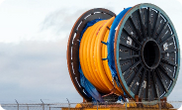4 SAFETY TIPS FOR WORKING WITH ELECTRICAL CABLES
Taking safety precautions when interacting with electrical cables is crucial both in the workplace and in everyday life. Not knowing safety precautions can result in serious injuries and even electrocution. Luckily, the rules that help to avoid these situations are pretty simple.
Here are four safety tips for interacting with electrical cables:
Mind The Overhead Wires
Overhead wires are always energized, Even When they are not. Never touch an overhead wire that may still be live. Even if you see a cable that has been downed or seems to be insulated, it is always best to assume that it is still active.
Let Your Cables Unwind Before Use
As power flows through electrical cables, they will emit heat. Usually, this warmth harmlessly dissipates in the air. However, when a cable is coiled around a reel, heat can build up and melt the protective insulation. This is a colossal electrocution risk! Avoid overheating by unwinding the reeled cable before energizing it.
Take Care of Your Cables
A cable that is walked on, driven over, and stuck in doorways cannot be relied upon. As these electrical cords become frayed and damaged, their internal wires may be exposed. To avoid electrical fires and shocks, make sure that all cables are protected from physical damage.
Water and Electricity Are a Dangerous Combination
The dust and minerals suspended within the water will conduct electricity, so be especially cautious in moist environments. Do not use electrical equipment while you are in contact with water, and have a qualified electrician inspect wet electrical equipment before you attempt to energize it.
Use Cables According To Their Purpose
Follow the manufacturer's guidelines when you purchase your cables so that you do not end up buying a cable that is simply wrong for your electrical project. You should also choose the correct size, voltage, and ampacity at all times. Choosing the wrong cables results in an immediate electrical hazard upon installing it and long-term risks because the building's electrical system is seriously compromised. Exceeding the recommended ampacity of the cable results in the degradation of the cable's insulation and conductor. If the wire gauge is too small for the breaker, it can melt and catch fire. In addition, cables have other essential characteristics, like their ability to resist the impact of water, abrasion, specific temperatures, etc. If the cable you picked does not fit the features required by your electrical project, the chances of an electrical hazard multiply. If you are not sure which type of cable and wire gauge to use, consult the seller. It is always better to be safe than sorry.
Hopefully, these tips from our experts at Nassau National Cable will help you stay safe while using electrical wires. If you would like to learn about our portable power cable for sale online or any other quality products, call 1-800-480-9541.
















